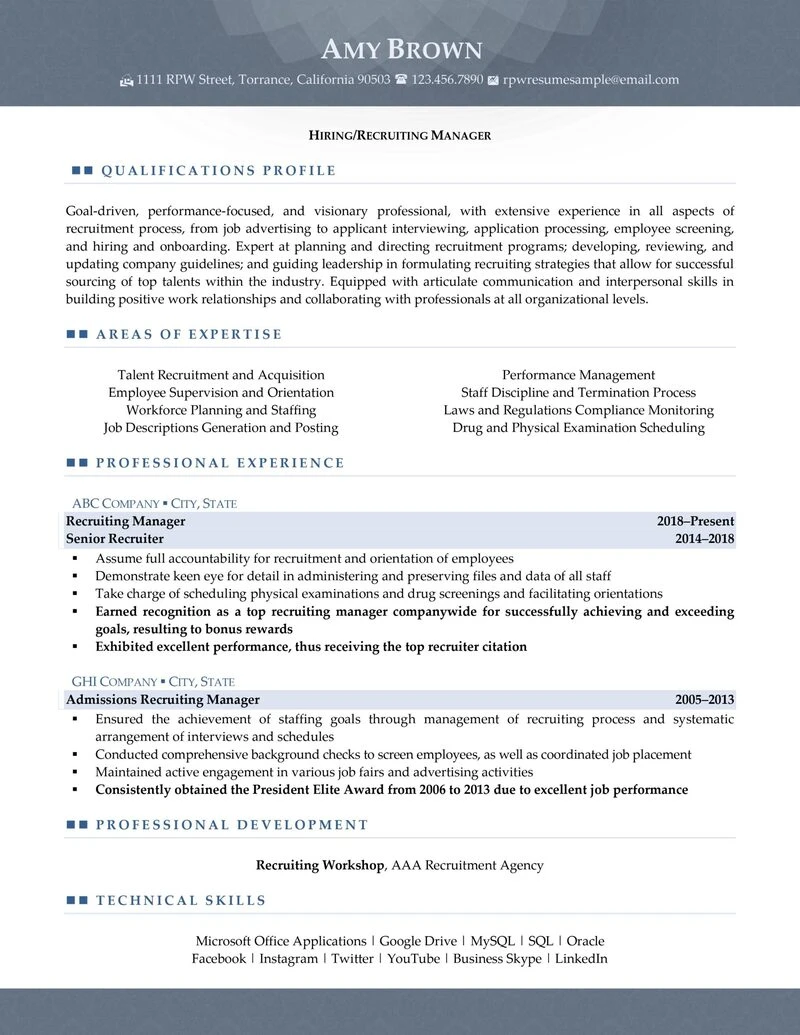Recruitment is an essential process of a company’s human capital management. Recruiters not only assist hiring managers in placing the right people in the proper jobs; they also promote the company’s reputation and appeal as a viable employment prospect. As a result, many companies invest in hiring an expert to oversee their recruitment process, which leads to a steady increase in job opportunities for this position.
In fact, the US Bureau of Labor Statistics (BLS) predicts that HR roles, including recruiters, would rise by 7% between 2020 and 2030. This simply indicates that aspirants and experts in this industry can anticipate a bright future. Aside from being a sought-after position, recruiting is also a well-paying profession. According to Payscale, the average salary for a recruiter in the United States is $77,044 a year, with the potential to rise to nearly $111,000.
That being said, the sector for recruiters may be highly tough, and understandably so. With such competition, it’s not simple to land a position as a recruiter with a standard application tool. You will need a recruiter resume that will effectively showcase your skills and set you apart from the rest.
Having trouble coming up with one? Worry not, because this article will teach you not only the basics of information about recruiters but also how to construct an eye-catching resume that will make you stand out from the crowd.
What is a Recruiter?
A recruiter is a professional who is in charge of sourcing for qualified and dedicated candidates for specific open positions at an organization. A recruiter’s main goal is to meet the demands of both the employer and the employee throughout the hiring process.
These human resources professionals are also responsible for screening and evaluating the applicant’s qualifications in light of their professionalism, punctuality, and other factors to make sure the fit works well for both parties. They also serve as liaisons between employers and applicants in terms of facilitating job offers and salary negotiations.
Although they are known for having strong knowledge of the end-to-end process of talent acquisition, not all recruiters work the same way. Some employees work for a single company full-time and internally, while others work remotely or on a temporary basis for larger organizations and staffing firms. Additionally, there are several kinds of recruiters who can help you with your job hunt, such as:
- Staffing Recruiter
- Staffing Agency Recruiter
- Corporate, In-house, or Internal Recruiter
- Outplacement Recruiter
- Contingency Recruiter
- Retained Recruiter
- Headhunter
- Consulting Company Recruiter

What are the Duties of a Recruiter?
Although recruiter positions focus on a variety of steps in the hiring process, their duties and tasks might change based on the company and field they work for. The following are some typical duties and tasks of a recruiter:
- Identify future hiring needs and develop job descriptions.
- Work closely with department managers to compile a consistent list of job requirements.
- Attract suitable candidates through databases, online employment forums, and social media posting.
- Organize and conduct interviews to identify suitable applicants to fill open positions.
- Serve as primary contact and build positive relationships with candidates during the selection process.
- Screen and evaluate applicants’ knowledge, skills, and experience that best suit the job vacancy.
- Promote the company’s reputation and attractiveness as a good employment opportunity.
- Keep abreast of the current employment legislation and regulations.
- Handle the recruitment materials and other job advertisements.
- Prepare analytical and well-documented recruiting reports for the hiring managers.
How Do You Become a Recruiter?
Compared to many other professions, starting a career in recruiting is quite more challenging. Fortunately, there are a few steps you can take to help you thrive in this position. These include the following:
1. Earn a college degree in Human Resources or another related field.
A bachelor’s or master’s degree in HR management and related courses is required for many recruiter roles. And earning a degree will give you the background and foundation you’ll need to comb through resumes and find the most suitable people. This type of degree will also help you prepare for challenges you may experience as a recruiter.
2. Gain a Human Resources certification.
Having certification as a Professional in Human Resources can give you an extra edge over other applicants competing for the same job. This type of certification also demonstrates your level of dedication and seriousness to employers. In fact, according to HR Academia, the majority of hiring managers are highly prefer selecting candidates which have earned certifications in the field of human resources.
3. Acquire relevant or practical experience.
Join relevant student organizations and pursue human resources internships to gain expertise in this sector. Job shadowing a professional recruiter is also an excellent method to learn about the business and develop connections in the field.
4. Develop your technical skills.
As a recruiter, you will spend a lot of your time on the Internet. So, it’ll be a good idea to develop your technical skills before applying for a job. You should also want to learn how to use common applications used in the recruitment process including but not limited to applicant tracking systems (ATS), LinkedIn, and HRIS.
What to Include in Your Recruiter Resume
As a recruiter, you are aware that having a strong job search tool that sums up your experience is essential if you want to advance your career in any field. And even if you are familiar with the specifics that a hiring manager is looking for, writing your own resume can be difficult. So, to help you, we’ve listed standard sections and crucial details you should add to your own recruiter resume to wow the hiring managers:
Contact Information
Be sure to list your full name, followed by your mailing address, phone number, and email to make it easier for the employer to get in touch with you. Your LinkedIn page can also be included along with a link to your website or blog post if they are relevant to the position.
Expert Tip
Although the majority of employers no longer request applicants’ home addresses on resumes, some companies and job sites still use the ATS that filters results based on location. Therefore, it is preferable to include one to increase your chances.
Specific Target Job Position
Hiring managers want to see your skills and experience, but they also want to see that you are considering a specific position. To make it easier for hiring managers to understand what position you are applying for, include the desired job title as often as you can.
Qualifications Profile
Qualifications profile or resume summary is a section that is normally seen on top of a resume and composed of three to five short phrases that explain to the hiring manager why you are qualified for the position. This is also the resume section that gets the most attention, aside from your employment history. Thus, be sure to emphasize your strongest skills and most impressive achievements in this section if you want to be considered for the recruiter role.
Areas of Expertise
Also known as core competencies, this skills section is often used by hiring managers to get a brief review of your professional abilities and industry keywords. Hence, make sure to list your skills on your resume that are related to your target position. You may also use bullet points when listing your expertise to help the hiring manager understand your abilities easily.
Related Article:
Professional Experience
Your work history section is one of the most crucial parts of your resume. It should include information regarding your previous experience, such as your job title, former employers’ names and addresses, and the period of time you worked there. List your employment in inverse chronological order and provide a few bullet points outlining your primary tasks and accomplishments.
Expert tip:
Instead of listing every job responsibility, focus on those that have skills and qualifications similar to those of the position you are looking for. It’s also a good idea to display actual results using statistics and numbers.
Education
Your resume’s education section gives hiring managers a detailed insight of your expertise and how it relates to the recruiter role. And when it is relevant to the job’s criteria for hiring, your education section might also set you apart from other applicants. For this reason, make sure to highlight the specifics of your educational background, especially if they are pertinent to the post to keep yourself on the lead.
Professional Development
Training, licenses, and certificates are all helpful ways to demonstrate your level of expertise to potential employers. So, if you have the related HR certification and training, list them in your recruiter resume. These additional credentials will make you more appealing compared to other job hopefuls that lack training.
Professional Affiliations
In pursuing a recruiter career, professional associations can be a huge help. Membership in reputable HR organizations like the Society for Human Resource Management (SHRM), the Association of Talent Acquisition Professionals (ATAP), and the National Association of Executive Recruiters (NAER) will also make you stand out from the competition.
Optional Sections for Your Recruiter Resume
To improve your chances of landing the position over other applicants, you might also consider adding more information aside from the areas described above, including activities, awards, and project sections.
How to Write Your Recruiter Resume
Recruiters and hiring managers have strict hiring standards for any vacant position. Why? To put it simply, they need to ensure that the candidates they will hire are perfect for the roles and have a good amount of talent to achieve company goals and objectives. But now that you are an applicant and not a recruiter, how will you snag this position? Learn how to make a good impression on the hiring manager with the help of these resume writing tips:
1. Choose the best resume format and layout
As a recruiter, you should know that the majority of hiring managers examine the format and presentation of your recruiter resume. As much as possible, try to create an ATS-friendly layout and give yourself a competitive edge on the job market by refraining from using exaggerated designs and fancy font styles.
Additionally, when creating your recruiter resume, use the format that best represents your experience as a recruiter. If you already have a lot of industry experience, choose the chronological format. If not, use alternative formats to show what you can do for their company.
2. Flaunt your accomplishment.
In your employment history, try to emphasize more of the results you drive and downplay your day-to-day responsibilities. Why? It’s because you and the hirer are both aware of the job of a recruiter. Instead, focus on what you have attained and list your contribution to the business goals.
3. Highlight HR-related keywords.
You are the person who knows more than anybody else how important keywords are for both human readers and HR monitoring systems. Your application will suffer if you don’t include resume keywords, and the worst employers may reject it. Avoid letting this happen to you! Add keywords to your recruiter resume at all times.
Recruiter Resume Example
Want to see a job-winning recruiter resume that is in line with current resume trends? Check out this resume sample written by one of our expert writers to help you craft your own or update your copy.

Note: For more ideas, you can review additional resume samples created by our HR industry experts.
Ready to Succeed as a Recruiter? Let Our Expert Assist You Land Your Job Search
Despite the fact that the majority of recruiters are aware of what to look for when analyzing a resume, it is still hard for them to create their own resume because it is challenging to evaluate personal achievements and qualifications with unbiased eyes. Apart from that, other recruiters typically expect their resumes to be spotless, which is another reason making their own CV can be more stressful.
So, if you’re sitting down to write your recruiter resume and are overwhelmed, relax! Resume Professional Writers has got your back. We have professional writers who are not only familiar with the recruitment cycle, but also experts in writing resumes and cover letters for recruiters. Contact us right away, and let us help you succeed in your job search!





